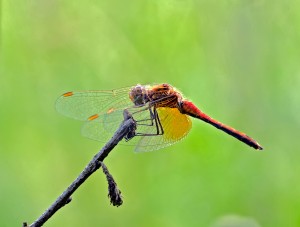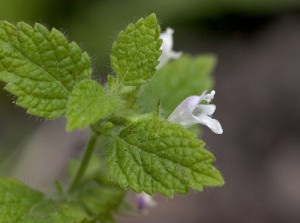Up until I was five, I lived in a swampy, marshy area where the air was thick with bugs in the summertime. I distinctly remember the nights I wasn’t allowed to go outside to play because the mosquito truck was going by, spraying poison into the air to quell a rampant mosquito population.
Mosquitoes aren’t just annoying—they’re dangerous. That’s why Bill Gates declared war on them in May. They can spread malaria (responsible for about 1 million deaths a year), West Nile virus, and over 30 other arboviruses. But there has to be a better way to fend them off, doesn’t there?

Keeping a few goldfish in ponds or livestock watering troughs will keep mosquito larvae from multiplying.
I am pleased to announce that yes, there are alternatives to mass-pesticide spraying. Quite a few alternatives, in fact. Summer is a time to be outside, so here are some ways to keep mosquitoes away while you relax and play.
Prevent It
For starters, there are some basic actions you can take to make your yard a mosquito-free (or at least less mosquito infested) zone.
- Eliminate their breeding places. Anywhere that holds more than a tablespoon of standing water for a week is a potential breeding ground for mosquitoes. Once or twice a week, go around your yard and search out anything that might capture rainwater and empty it—onto your garden, perhaps? Clogged gutters are infamous for allowing mosquitoes to breed.
- Keep fish. If you have standing bodies of water that you want to keep around, such as ponds or animal toughs, keep some fish in there. They’ll eat any mosquito larvae before they can become major pests.
- Encourage the mosquito’s natural predators. While it may seem like the mosquito is out to get you, lots of other things are out to get it—including dragonflies, ants, ground beetles, spiders, water striders, frogs, and snails. Create an environment where these critters can thrive. (Although this may not work as well if you’d rather repel other bugs as well… such as, say, spiders.)
- Turn on a fan. If you like to sit on a porch or deck, try using a fan. Mosquitoes aren’t very strong flyers, and a fan will deter them.
- Don’t use broad insecticides on your yard, as they harm everything, including the beneficial insects (which will just mean bigger problems for you down the road), not to mention they’re dangerous to the environment, your health, and your pets’ health. The same goes for bug zappers, which actually don’t attract many mosquitoes.
Make It
After you’ve covered all your mosquito prevention bases, it’s time to break out the insect repellent. Avoid anything with DEET, though—it can have harmful side effects. Wellness Mama has some good homemade mosquito repellent recipes, using:
- Essential oils. They’re back! Last seen in my post on natural remedies, essential oils are essentially just good to have on hand. Mosquitoes react strongly to scent, and some of the oils that they hate include citronella, clove, lemongrass, rosemary, tea tree, cajuput, eucalyptus, cedar, catnip, lavender, mint, penny royal, and rose geranium.
- Apple cider vinegar. Vinegar has such a potent smell that it might not just be mosquitoes you’re repelling—it might be other people, too. But this is a good option for when the mosquitoes are really persistent and an essential oil brew just isn’t doing the trick.
Buy it
If you’re not a do-it-yourself kind of person, your next best option might be buying a natural insect repellent. Here are some examples of natural repellents you can get online or in some stores:
Plant it
Finally, you might consider making a few additions to your garden to ward off mosquitoes. All of the following plants can help, to some degree or another, repel those buzzing biters:
- Citronella—the classic mosquito repellent.
- Horsemint—it will also attract bees and butterflies.
- Marigolds—they also repel insects that prey on tomato plants.
- Agerantum/flossflowers
- Catnip—in 20o1 entomologists at Iowa State reported that it is ten times more effective than DEET at repelling mosquitoes.
- Lemonbalm—has similar effects of citronella. You can crush the leaves and rub them on your skin for light protection.
Hopefully adding a few of these tips this summer can help you avoid those itchy red bumps and any potentially harmful diseases that might come with them. But remember, while some mosquitoes are invasive species and dangerous to humans, other bugs you might think of as pests– such as bees or spiders– are often part of a healthy, balanced ecosystem (not to be confused with a healthy, balanced breakfast) and are best left alone. They won’t bother you if you don’t bother them!
By Jessica Edington


